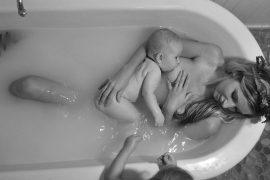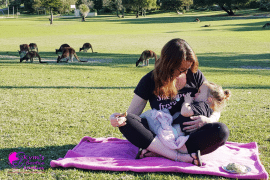You can read more about this if you look into the work of Dr Nils Bergman who has been pioneering Kangaroo Mother Care in South Africa. In his eyes, close contact with baby and frequently offering the breast isn’t about the care of premature or unwell babies. It isn’t some freaky hippy option preferred by the muesli-knitters. It’s just science and it’s who we are as a species. If it makes you sad, by all means try something new and try and find something that works for your family. A lactation consultant can help you try and tweak your baby’s routine. And yes, constant feeding and unsettled behaviour might suggest a problem that needs addressing.
In his eyes, close contact with baby and frequently offering the breast isn’t about the care of premature or unwell babies. It isn’t some freaky hippy option preferred by the muesli-knitters. It’s just science and it’s who we are as a species.
But know that frequent feeding and a baby “that just won’t go down” is the norm. The baby that feeds and settles but wakes and becomes unhappy when placed on a cold non-human surface is the norm. Put clocks away and tap into those millions of years of evolution. Trust that we’ve got to where we are as a species because babies exhibit useful cues and we respond. Babies grow with milk and love. And it works.
This message is at the heart of a lot of what we need to talk about when it comes to parenting.
We need to know how things went pear-shaped in the mid to late 20th century and why our breastfeeding rates reached an ALL-TIME low as a species when we tried to impose artificially-constructed ideas onto our biological norm.
We need to know how many of the most popular baby care books on the market today are STILL informed by these 20th century ideas – that were just a blip on the landscape of human society, historically and globally.
And there are parents out there right now who think a baby that longs to be in their arms is some kind of personal failing. Phrases like “spoiling a baby”, “rods for our back” and “show them who’s boss”, come from this unnatural blip. Our parents and grandparents embraced the mid-20th century blip and sometimes need desperately to see a validation of their own parenting choices in the decisions that we make. It doesn’t make for easy family relationships when we say, “actually we don’t feel wearing my baby in a sling or feeding more than 4-hourly is ‘spoiling my baby’, thanks gran.”
New mums who worry that their baby still feeds 2-hourly most of the time at 3 months and that this means something is “wrong” need to know the science of breastmilk and breasts. There are baby care books with sales booming who fundamentally misunderstand how breastmilk storage capacity might impact a mother’s intervals between feeds and have ignored research from the last 2 decades. There are mothers out there who genuinely think they should be aiming for 4-hourly intervals.
After a career as a Deputy Headteacher in central London, Emma initially trained with UK charity Association of Breastfeeding Mothers (www.abm.me.uk), qualifying as a breastfeeding counsellor with them in 2007. She is currently their chair. She qualified as a Board Certified Lactation Consultant (IBCLC) in 2011 and combines a small private practice with volunteering at two groups a week and answering calls on the National Breastfeeding Helpline. You can find her on Twitter as @makesmilk. She spoke at the UNICEF Baby Friendly UK conference in November this year on the theme of responsive feeding. Her book, “You’ve Got It In You: a positive guide to breastfeeding” can be found on Amazon and from other retailers: http://www.amazon.co.uk/dp/B019JE5E44










